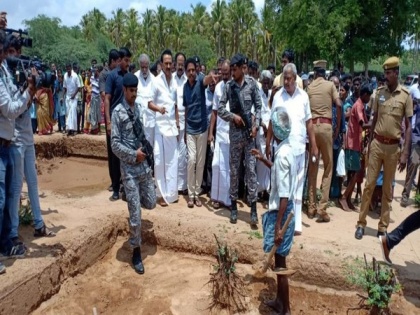Tamil Nadu: MK Stalin visits Sivaganga archaeology site
By ANI | Published: September 27, 2019 05:21 PM2019-09-27T17:21:27+5:302019-09-27T17:45:03+5:30
Opposition leader and Dravida Munnetra Kazhagam (DMK) president MK Stalin on Friday visited the Keeladi archaeology site as part of the fifth phase of excavation in Sivaganga in Tamil Nadu.

Tamil Nadu: MK Stalin visits Sivaganga archaeology site
Opposition leader and Dravida Munnetra Kazhagam (DMK) president MK Stalin on Friday visited the Keeladi archaeology site as part of the fifth phase of excavation in Sivaganga in Tamil Nadu.
The fifth phase of excavation started in June and likely to close in next month. Stalin has gone to every part of the site. The Keeladi village has been identified as a residence of Tamils. Excavation work has been conducted on behalf of the Central Archeology Department since 2015.
Stalin on Friday said the Keeladi once again proved the saying of Indian history has been started from South.
Addressing the media persons after visiting the Keeladi archaeology site he said, "The archaeology experts have been mentioning the Indian history started from Tamil Nadu. Adding to the theory, the finding and excavation in Keeladi have again proved it."
"Like Sanouli in Uttar Pradesh and Vat in Gujarat, the Keeladi archaeology site has to be declared as a protected site. The central and state government have to continue excavation in Keeladi and also in Athichanallur in Thoothukudi," the leader added.
The second phase was conducted in 2016 and phases three in 2017.
The government of Tamil Nadu undertook the fourth phase of the excavation in 2018 as various parties insisted on continuing the investigation. So far, 14 thousand 500 items have been found. Funds have been allocated to construct a trench to protect them.
In 2018, in the fourth phase of the excavation six-carbon samples were collected at the depth of 353 cm which goes back to 580 BCE.
The Keeladi cultural deposit could be safely dated between 6th century BCE and 1st century CE.
( With inputs from ANI )
Open in app